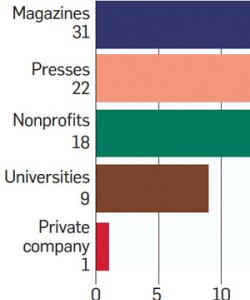Memoir and Memory, Women Writers on Ambition, and More
Hunter S. Thompson’s Rolling Stone legacy; Academy of Arts and Letters award winners; a Mary Gaitskill primer; and other news.
Jump to navigation Skip to content
Hunter S. Thompson’s Rolling Stone legacy; Academy of Arts and Letters award winners; a Mary Gaitskill primer; and other news.

Whether you end up distributing your own prose or poetry at a reading or collecting the work of your friends in limited editions, these instructions on how to create and bind your own chapbooks offer hours of bookmaking fun.

Launched in February, the New York–based organization Singapore Unbound supports Singaporean writing and cross-cultural literary exchange through a reading series, an annual literary festival, and a book review blog committed to promoting independent publishers and writers of Singaporean heritage from around the world.

As part of a continuing series, we offer a breakdown of the numbers behind our Grants & Awards listings in our March/April 2017 issue.
Women’s Prize for Fiction seeks new sponsor; Roxane Gay’s ABA conference keynote; Booker Prize winner Arundhati Roy’s return to fiction; and other news.
Zelda Fitzgerald on screen; non-love poetry in translation; National Magazine Awards omits fiction category; and other news.
Poet Susan Howe wins lifetime achievement award; what funding cuts to the NEA and NEH means for writers; Latinx writers on the lack of Latinx faculty at retreats; and other news.
Ron Padgett on the poems he wrote for the film Paterson; Philip Roth on the similarities between the current presidency and one of his novels; writers on Burns Night; and other news.
“Dutch classic” 1947 novel translated into English for the first time; American Library Association announces winners of its Youth Media Awards; novelist Anuk Arudpragasam on articulating inner life; and other news.